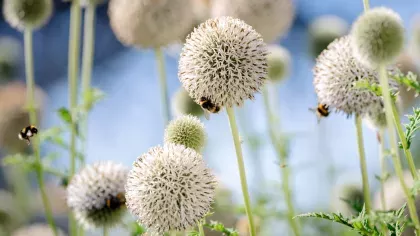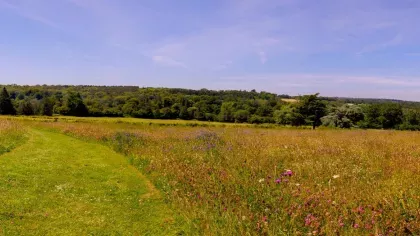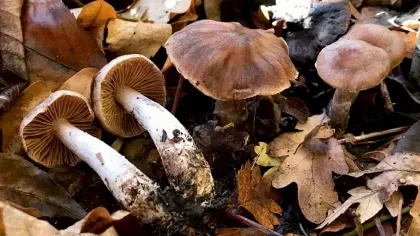Landscape Ecology Programme: Nature Unlocked at Wakehurst
Connecting Wakehurst’s landscape, science, and visitors to research the value of nature for people, agriculture, and the environment.

Aims and expected outcomes
The Landscape Ecology Programme aims to research, engage with, and share the values of UK biodiversity.
The programme has five, connected deliverables:
- Deliver high-quality, innovative science to measure, define and monitor natural capital across Wakehurst and varied UK landscapes
- Inspire engagement, participation and learning through citizen science and public programmes, enhancing an understanding of and connection to nature
- Train the next generation through interdisciplinary higher education programmes and internships focused on valuing and protecting UK biodiversity
- Share replicable protocols and best practice in land management for nature-based solutions and enhancing biodiversity across varied land uses and stakeholders
- Inform and influence policy and practice on nature-based solutions across UK, facilitating long term, effective adaptation and mitigation to climate and biodiversity crises
The programme is currently in an initial three year phase with the following themes:
- Climate adaptation and mitigation - carbon storage, gas flux and biodiversity including mycological diversity
- Invertebrates in the landscape - including pollinator traits and capacity
- Water and landscape function - including hydrological services for climate adaptation, mitigation and resilience
- Nature connectedness - people's connection to and values of biodiverse landscapes
The programme is an exemplar of the role of collaborative, interdisciplinary research on nature-based solutions across varied UK landscapes.
Wakehurst’s landscape is transforming into a ‘living laboratory’ to scientifically measure nature’s benefits for people and the environment over the long term.
We're making Wakehurst a place for the public to engage with nature and science and research, and are influencing UK policy and practice on how to best manage land and use nature to solve environmental and social challenges.
Why we strive towards these goals
To adapt to and mitigate the threats of biodiversity loss, climate change and land use change, we need nature-based solutions; interventions in which humans act as ecological stewards of nature, recognising and valuing its benefits and working with nature to address social and environmental challenges (IUCN, 2009).
Nature-based solutions must integrate comprehensive accounts of natural capital and associated ecosystem services across landscapes and involve local stakeholders, especially local communities, to be effective in the long-term.
National frameworks have been developed to assess natural capital, such as the Ecosystem Service Framework and the Habitat Classification Framework.
The UK government is also currently transitioning from the EU’s Common Agricultural Policy to the Environmental Land Management scheme which, from 2024, will include paying landowners for maintaining ecosystem services and biodiversity.
As part of the UK government’s Environment Bill, there will be a mandatory Biodiversity Net Gain (BNG) requirement, with the development of biodiversity metrics and standards for land management that benefits with wildlife and people in the long-term.
However, these frameworks and policies are currently undermined by a lack of data, infeasibility for large-scale systematic monitoring and need for additional biodiversity and natural capital metrics to define ‘good’ land management and nature-based solutions across variable landscape types.
There also needs to be an integration of data from local communities on the cultural and social benefits of being in nature, helping to influence priority areas for the management of ecosystem services and protection of landscapes.
Based at Wakehurst, Kew’s wild botanic garden, the Landscape Ecology Programme (Nature Unlocked) is addressing these needs.
The programme has been jointly developed between Wakehurst and Kew Science’s Ecosystem Stewardship Priority and it will connect Wakehurst’s three greatest assets: a multi-habitat and biodiverse landscape with leading best practice in land management and horticulture; Kew Science expertise and strong partnerships; and Wakehurst’s visitors and long-standing public programmes to research the value of nature for people and the environment.
Department
Ecosystem Stewardship
Landscape, Horticulture & Research (Wakehurst)
Team
Programme leads
Ed Ikin
Paul Wilkin
Programme officer
Lyndsey Fowks
Climate adaptation and mitigation (carbon)
Justin Moat
Tim Wilkinson
Thomas Robson
Laura Martinez-Suz
Jill Kowal
Jim Clarkson
Gary Egan
Guilherme Castro
Invertebrates in the landscape (pollination)
Phil Stevenson
Janine Griffiths-Lee
Nature connectedness
Lorraine Lecourtois
Our scientists are working with Directorates across Kew to help share research and protocols in natural capital valuation, engage diverse audiences, and influence policy and practice on UK nature-based solutions.
- University of Sussex
- Royal Holloway University London
- Imperial College London
- HM Treasury
- Sky Zero
- Mount Anvil & Partners
- Players of People’s Postcode Lottery
A partnership between RBG Kew & Sky produced this in-depth guide for achieving economic and environmental goals through investing in Nature
10 Guiding Principles for Investing in Nature
Mattana E, Chapman T, Miles S, Ulian T, Carta A. (2023)
Regeneration from seeds in a temperate native flora: A climate-smart and natural–capital-driven germination risk modelling approach
Plants, People, Planet 2023: 1-15
Suz, L.M., Bode, J., Byrne, A., van der Linde, S. & Bidartondo, M. (2022)
Nutrients, Carbon, Mycorrhizas and Tipping Points in Forests.
Royal Forestry Society 116: 36 - 43.
Nature Unlocked Impact Report 2022-23
Nature Unlocked Impact Report 2021-22
Online
Plough Magazine (01.09.23) Learning to Love Grass
Acre (21.02.23) Funding for pioneering nature projects to identify carbon capture
SG Voice (14.02.23) Six UK projects to be funded under study of nature-based solutions
Farming Online (13.02.23) Pioneering nature projects launched to test carbon capture methods in fight against climate change
Business Green (11.02.23) Natural England announces funding boost for nature-based carbon capture projects
Gov.uk (11.02.23) Pioneering nature projects launched to test carbon capture methods in fight against climate change
The Environment (30.11.22) A walk on the wild side
Visions of Soon (12.09.22) A Shift in Perception
SussexWorld (11.08.22) Wakehurst in Ardingly on TV this August: Channel 5 show looks at Sussex's own American Prairie in full bloom
Family Grapevine - Mid Sussex (08.08.22) Nature Unlocked: Wakehurst calls on public to participate in major study
Farmers Weekly (22.07.22) Royal Welsh: Grass beats trees as carbon sink, says Batters
BBC Future (13.06.22) How to turn your garden into a carbon sink
SussexWorld (28.04.22) Wakehurst visitors asked to wear heart rate monitors for major new biodiversity study
Sky News Online (24.05.21) New 'living laboratory' launched by Kew Gardens to study biodiversity benefits in UK
HortWeek (21.05.21) Kew's Wakehurst garden to become 'living laboratory'
Broadcast
Meridian FM (25.09.22) Interview on Nature Connectedness
BBC South East (18.10.23) Feature on carbon research
The Environment (01.12.22) A walk on the wild side
Sky News (22.05.21) Kew’s wild botanic garden Wakehurst to become a ‘living laboratory’
Garden Answers (01.09.22) ‘Nature and wellbeing study’
Bognor Regis Gazette (04.05.22) ‘Venue to become a Living Laboratory’


